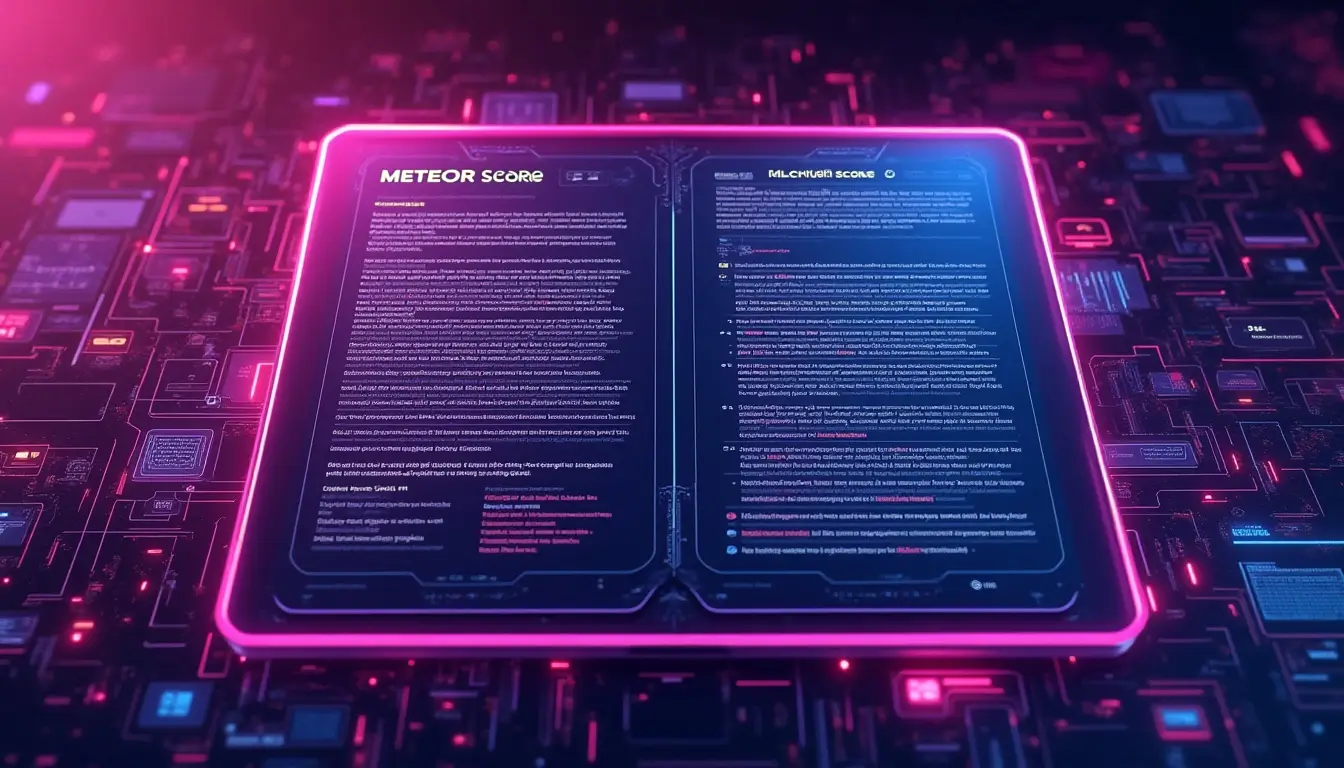Share
Table of contents:
The METEOR (Metric for Evaluation of Translation with Explicit ORdering) score is a metric used for evaluating the quality of machine translation. It was developed to provide a more effective assessment of translation output compared to traditional metrics such as BLEU (Bilingual Evaluation Understudy). METEOR aims to correlate more closely with human judgment by considering various linguistic factors and aspects of translation quality. It is particularly valuable in assessing translations in a way that reflects the nuances of human language.
Core Characteristics
- Design Philosophy:
The METEOR score is designed to address some of the limitations of earlier metrics by incorporating multiple levels of linguistic analysis. It considers not only the exact matches between words in the machine-generated translation and reference translations but also synonyms, stemming (reducing words to their root forms), and paraphrases. This broader perspective allows METEOR to evaluate translations more holistically and contextually.
- Components of the METEOR Score:
The METEOR score consists of several components that contribute to its final value. These components include:
- Precision: This refers to the proportion of content words in the translation that match with the reference translation. It emphasizes the correctness of the words used in the translated output.
- Recall: Recall measures the proportion of content words in the reference translation that are also present in the machine-generated translation. This component assesses how well the translation captures the meaning of the original text.
- F-Score: The METEOR score integrates precision and recall using the F-score, which is a harmonic mean of precision and recall. The F-score is calculated using the formula:
F = (1 + β^2) * (precision * recall) / ((β^2 * precision) + recall)
where β is a parameter that determines the weight given to precision versus recall. In METEOR, β is typically set to 0.5, giving more importance to precision. - Alignment: The score takes into account the alignment between the generated translation and the reference translations. This alignment process looks for matches not only in exact words but also in stems and synonyms, allowing for a more flexible assessment.
- Penalties: METEOR introduces penalties for word order discrepancies and fragmentation in translation. If the words are not in the same order as in the reference, a penalty is applied, reducing the overall score. Additionally, if the generated translation contains multiple unrelated segments, a fragmentation penalty is incurred.
- Score Range and Interpretation:
The METEOR score ranges from 0 to 1, where a score closer to 1 indicates a higher quality translation. A score of 1 represents a perfect match with the reference translation, while a score of 0 indicates no overlap. The interpretation of the METEOR score allows researchers and practitioners to compare the quality of different machine translation systems or configurations quantitatively.
- Multiple Reference Translations:
One significant advantage of the METEOR score is its ability to evaluate translations against multiple reference translations. In practice, human translations may vary significantly; thus, METEOR can accommodate multiple correct translations, reflecting the diversity of human expression. The algorithm calculates the score based on the best match with any of the available references.
- Applications:
The METEOR score is widely used in various applications of natural language processing (NLP), particularly in machine translation, but also in related tasks such as text summarization and paraphrase generation. It is implemented in various evaluation frameworks and datasets, enabling consistent assessment across different translation systems.
- Limitations:
Despite its strengths, the METEOR score is not without limitations. While it performs well in capturing lexical semantics, it may not fully address deeper contextual meanings or idiomatic expressions present in language. The reliance on exact and stemmed matches can sometimes overlook nuanced variations in meaning. Additionally, while METEOR provides a more comprehensive evaluation than BLEU, it may still not align perfectly with human judgments, particularly in cases of stylistic and syntactical differences.
- Evolution and Improvements:
Since its introduction, researchers have sought to enhance the METEOR score further by incorporating more advanced linguistic features, such as semantic similarity measures and contextual embeddings from deep learning models. These improvements aim to refine the evaluation process, making it more representative of human assessment standards.
In summary, the METEOR score serves as a vital metric in the evaluation of machine translation quality. By combining precision, recall, alignment, and penalties, it provides a nuanced and contextually aware assessment of translation outputs. The ability to accommodate multiple reference translations further strengthens its utility in the field of natural language processing. Through ongoing research and development, the METEOR score continues to evolve, reflecting the dynamic nature of language and translation technology.


%20(1).webp)

.webp)







